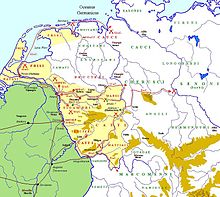Battle of Arbalo
| Battle of Arbalo | |||||||
|---|---|---|---|---|---|---|---|
 Campaigns of Drusus | |||||||
| |||||||
| Belligerents | |||||||
| Romans | Germanii | ||||||
| Commanders and leaders | |||||||
| Drusus | unknown | ||||||
| Casualties and losses | |||||||
| unknown | unknown, probably high | ||||||
The Battle of Arbalo was a fight between the Romans and the Germanii in 11 B. C. It was part of the Drusus campaigns (12 to 8 B. C.)
As part of operations by Augustus to secure the borders of the Roman Empire, Drusus, military commander and stepson of Augustus, was given the order to pacify the region on either side of the River Rhine. In spring 11 B. C. he crossed the Rhine with his army and defeated the Usipetes. He built a bridge over the Lippe and marched through the territory of the Sugambri and the Cherusci to the Weser.
During its return march to the Rhine the army was lured into an ambush at a place called Arbalo[1], which has not been precisely identified. They were attacked in a narrow pass by Germanii, probably Sugambri, possibly supported by Cherusci and parts of the Chatti.
According to Cassius Dio,[2] despite the element of surprise, the surrounded Roman legionnaires were able to beat off the undisciplined Germanii. After the battle, the Roman general built a fortified Roman camp, which has been identified as Oberaden, a site that has been archaeologically investigated.
References
- ^ Titus Livius, periocha 140: Cherusci Tencteri Chauci aliaeque Germanorum trans Rhenum gentes subactae a Druso referuntur.
- ^ Cassius Dio: Historia Romana, 54, 33, 3–4.
Sources
- Pliny the Elder: Naturalis historia 11, 28, 55
- Cassius Dio: Historia Romana, 54, 32–33 & 36,3; 55, 1–2,3
